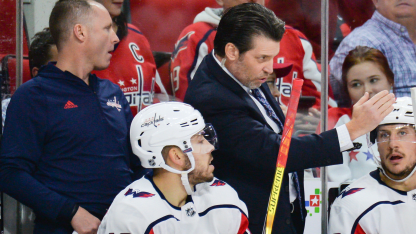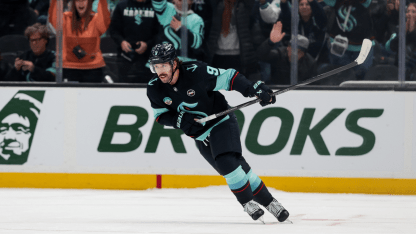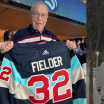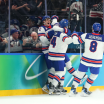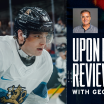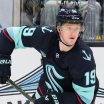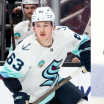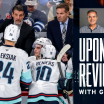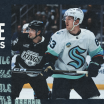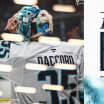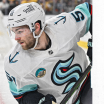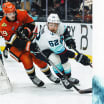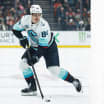Mixing Intensity and Teacher
In an unscientific but telling survey of two veteran Kraken players, Stephenson and captain Jordan Eberle, a certain adjective or two serve as common denominators when describing Lambert’s coaching persona.
“He’s intense, very competitive,” said Stephenson on the phone this past weekend. “He demands a lot, expects a lot. But he gives credit where credit is due. He’s always had a winning head coach mentality, mindset and demeanor, even as an assistant and associate coach. He wants to be successful. He cares a ton and wants buy-in from the guys. Doing your own thing doesn’t work out with him.”
“We're lucky to get a coach like this,” said Eberle last Thursday, not long after Kraken GM Jason Botterill called the team captain with news of Lambert’s hiring. “Lane’s got a huge winning pedigree. He's been around the league for a long time. His intensity is what sticks out to me. He has the passion and the energy, plus he brings accountability. His intensity is something that I think will be contagious.”
Intense? Check. Winner? Check, backed up by a 2018 Stanley Cup championship as top assistant to Barry Trotz in D.C. plus American Hockey League and International Hockey League (later merged into AHL) titles as a player, along with being an integral part of coaching staffs for 21 Stanley Cup Playoff series' over the last decade (including as head coach with the New York Islanders.
Both Kraken opened their comments with Lambert’s intensity, soon related to his lighter-hearted relationship-builder side, seemingly a must as a head coach in today’s NHL. Even Botterill concedes the days for a coach to yell at his players during an intermission and then stalk out of the locker room are “long gone.”
“Building relationships with players goes to show the coach he,” said Eberle. “He might be hard on you at times, but it's about giving you more confidence on the ice.”
“He’s a teacher at heart,” said Stephenson, answering fan questions about whether the new coach can help Seattle’s impressive bevy of prospects and under-23 NHLers.
In fact, Stephenson is an example of Lambert’s skills with younger players. During the Cup-winning season, Stephenson didn’t make the team coming out of training camp, returning to the AHL for a potential fourth straight season. But Capitals injuries cropped up, leading to Stephenson’s call-up. He played so effectively in all zones – and worked into a penalty-killing role thanks to Lambert’s advocacy – he appeared in 67 regular-season games and 24 contests in the Cup run in his rookie season. Lambert allows that he and his coaching staff can give guidance to promising players, such as Stephenson, back in the fall of 2017, but the player must be their own navigator.
“I think that’s really important for a young player to understand that — learn and kind of find his way with the guidance,” said Lambert back then about Stephenson catching on to increased ice time as the Cup year unfolded. “I’m not overbearing, just there to help him get his game to the level it needs to be an everyday player and to be a strong contributor. Because I think there’s no question about it with the talent he has, that’s what's in the future for him as long as he finds it within himself.”
The future, of course, played out to Lambert’s projections with Stephenson winning a second Cup as a key player for Vegas. The two have stayed in touch since then. They made sure to talk after games as opponents, and “we kept tabs on each other,” said Stephenson. For his part, Eberle talked last week about how much he appreciated Lambert reaching out to call the Kraken forward soon after it was announced that Eberle was the Kraken’s 2021 expansion draft pick from the Islanders.
Cup Day, Wedding Day
After Washington won the Stanley Cup in June 2018, Lambert enjoyed his traditional day with the Cup at his home in Scottsdale, AZ. His daughter dropped the puck of sorts with Cupful of Fruit Loops, then the trophy traveled to a local resort for brunch before a stop at the TPC Scottsdale acclaimed golf course. All represented terrific warmup acts and photo opportunities before the main event. Lambert and his wife, Annie, got married that afternoon.
Lambert and his previous wife, Andi, met in 1998 and married in 2001. Andi had been diagnosed with a rare form of breast cancer earlier in 1998, before the couple met. Lambert never flinched when she broke the news in the early days of dating. Andi, who died in 2015 at age 46, a day before the start of the Capitals' training, required surgery every five to 16 months due to recurring malignancies over the entire courtship and marriage. At Andi’s funeral outside Cleveland, the entire Washington team and many of Lambert’s former Nashville Predators players attended.
Lambert as Player Notes: PIM, Rookie Roomies, Long Game
When you start your junior career like Lambert did – with 104 goals and 129 assists for 233 points over two Western Hockey League Saskatoon seasons – getting picked 25th overall in 1983 by the Detroit Red Wings makes total sense. His roommate as a Red Wings rookie was Hall of Famer Steve Yzerman, who was selected fourth overall. For the first month, the duo lived with Colin Campbell, a veteran teammate who was inducted into the Hockey Hall of Fame as a builder in November 2011, recognizing his two-plus decades of service to the NHL as top executive of hockey operations. When Lambert and Yzerman moved into an apartment, then-Detroit GM Jim Devellano would stop by regularly to take them to a steakhouse, fearing they were not maintaining the best diets.
Lambert’s longevity as both a professional player (1980-2001) and coach in the WHL (2002-2005), AHL (2005-2011), and NHL (2011-present) is impressive. He played for 12 different professional teams, appearing in 283 NHL games and scoring 20 goals in his rookie year with the Red Wings. He played for three NHL teams, three AHL teams, two IHL teams, plus one franchise each in Germany’s and Switzerland’s pro leagues. His NHL numbers finished at 58 goals and 65 assists for 123 points. His long career was fueled by his contributions in all zones and his refusal to show fear of physical play or intimidate opponents, as evidenced by 521 penalty minutes in the NHL and a total of 1,240 penalty minutes across his pro regular seasons, as well as 119 in postseasons. When he asks Kraken players to get net-front or battle for the puck in corners this coming season, he knows plenty about what he speaks.

